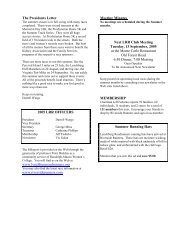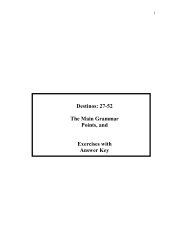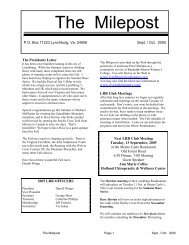Standard PDF - Randolph College
Standard PDF - Randolph College
Standard PDF - Randolph College
Create successful ePaper yourself
Turn your PDF publications into a flip-book with our unique Google optimized e-Paper software.
The Science of Religion<br />
in Britain, 1860–1915<br />
Marjorie Wheeler-Barclay’s upcoming book hailed as<br />
“major contribution to the history of ideas, the history<br />
of religion, and British history”<br />
When Marjorie Wheeler-<br />
Barclay’s book is released<br />
in November, it will represent<br />
more than 20 years of research and<br />
work.<br />
“Some people get really tired<br />
of something when they do it over<br />
a period of time,” said Wheeler-<br />
Barclay, the Charles A. Dana<br />
Professor of History. “I never did.<br />
I kept reading new things and<br />
learning new things, and that<br />
kept me excited about what I was<br />
doing.”<br />
Wheeler-Barclay’s book, The<br />
Science of Religion in Britain, 1860–<br />
1915, is part of the Victorian Literature<br />
and Culture Series published by the<br />
University of Virginia Press. “I’m<br />
particularly pleased that it is going<br />
to be published in a series that has<br />
a good reputation for Victorian<br />
history,” Wheeler-Barclay said.<br />
She began work on the project,<br />
which is based on her dissertation,<br />
more than 20 years ago. During<br />
that time, Wheeler-Barclay’s<br />
research has taken her to London,<br />
Oxford, Cambridge, and Scotland,<br />
where she spent time delving into<br />
archives of personal papers and<br />
other documents of six scholars<br />
from the late 19th century who<br />
studied religion as a social and<br />
human institution.<br />
“What they accomplished<br />
was not so much to persuade<br />
people that religion was true or<br />
false, but rather to contribute<br />
to a changing understanding of<br />
what religion itself was,” she said.<br />
“For many years, the consensus<br />
among scholars in different fields<br />
was that as societies become more<br />
industrialized and modern, they<br />
become more secular, and religion<br />
seems to be less meaningful. The<br />
past 20 years would suggest it is not<br />
that simple. Religion just doesn’t<br />
go away because people aren’t living<br />
in peasant societies.”<br />
A graduate of the University<br />
of Illinois in Chicago, Wheeler-<br />
Barclay earned her Ph.D. from<br />
Northwestern University. She came<br />
to the <strong>College</strong> in 1986 and teaches<br />
modern European history.<br />
The book has received favorable<br />
reviews from fellow scholars.<br />
Jeffrey Cox, author of The British<br />
Missionary Enterprise since 1700,<br />
said Wheeler-Barclay’s book was a<br />
“major contribution to the history<br />
of ideas, the history of religion, and<br />
British history … Wheeler-Barclay<br />
has succeeded in defining ‘the<br />
science of religion’ and put each<br />
of its practitioners into an entirely<br />
new light. It is a considerable<br />
achievement.”<br />
She wanted her book to<br />
provide a different perspective of<br />
the Victorian era. “It’s important<br />
for people to know that during the<br />
second half of the 19th century,<br />
debates about religion were not<br />
just about whether the Bible was<br />
literally correct. There was a much<br />
wider grappling of problems going<br />
on. A lot of American and European<br />
culture today ignores big questions<br />
because we don’t think they can be<br />
answered. In the 19th century, they<br />
had more of a tendency to tackle<br />
things head on. I find it admirable,<br />
and it’s certainly more fascinating<br />
as you get to know about Victorian<br />
culture.”<br />
Now that her book is finished,<br />
Wheeler-Barclay is wasting no time<br />
starting a new project. She began<br />
work on her latest research this<br />
summer. She is studying the history<br />
of the 19th century controversies<br />
surrounding Stonehenge.<br />
“I think,” she laughed, “I’ll just be<br />
doing an article for that one.”<br />
11


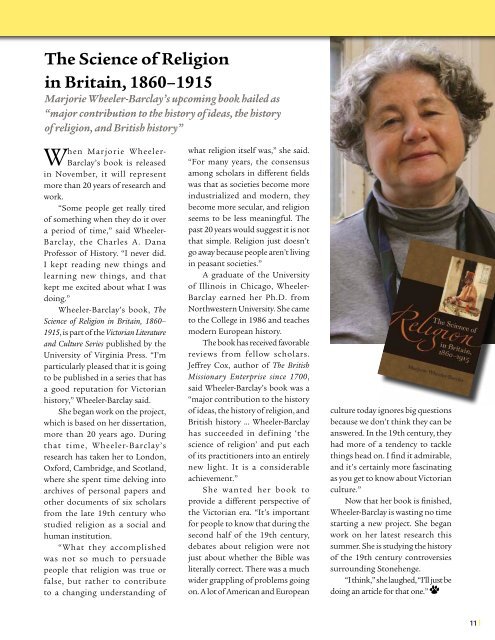

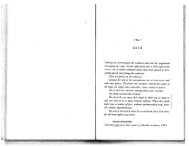
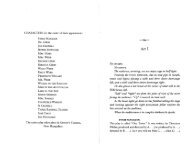

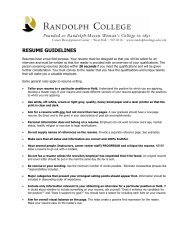
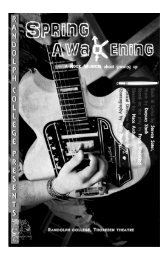
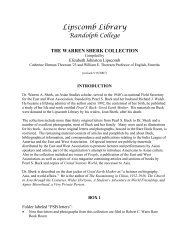

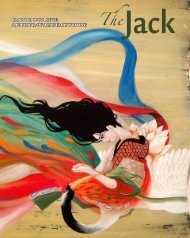
![Cast & Crew List [Program Copy pdf] - Randolph College](https://img.yumpu.com/38268916/1/190x123/cast-crew-list-program-copy-pdf-randolph-college.jpg?quality=85)

